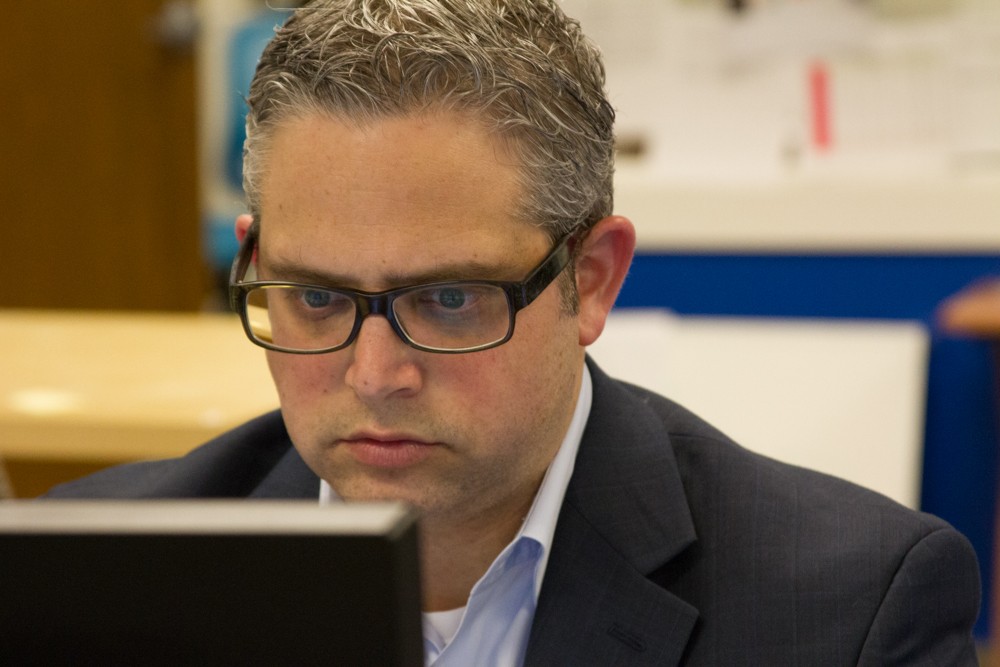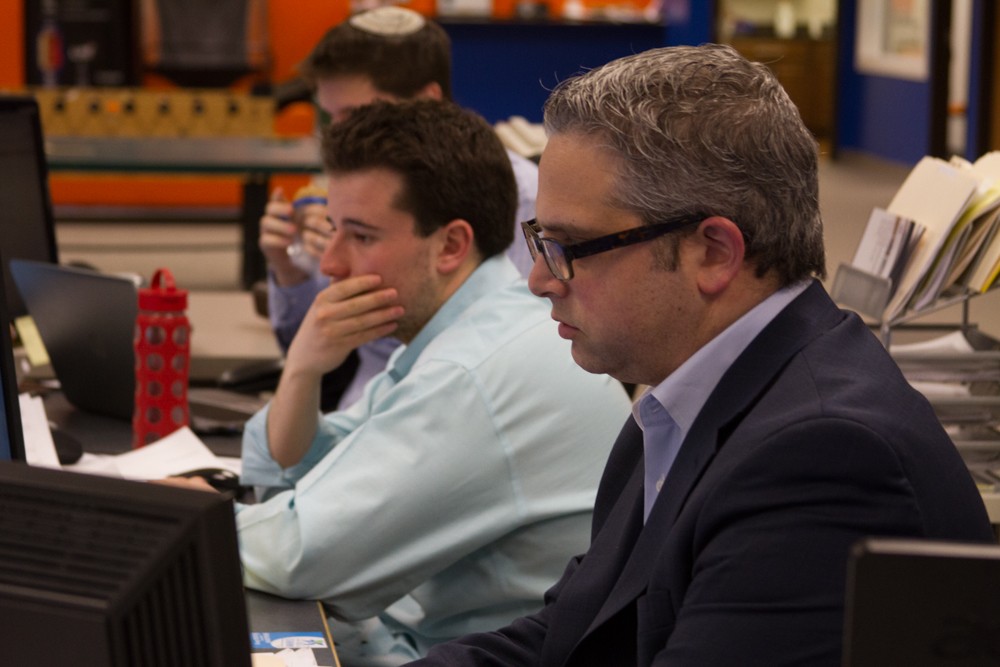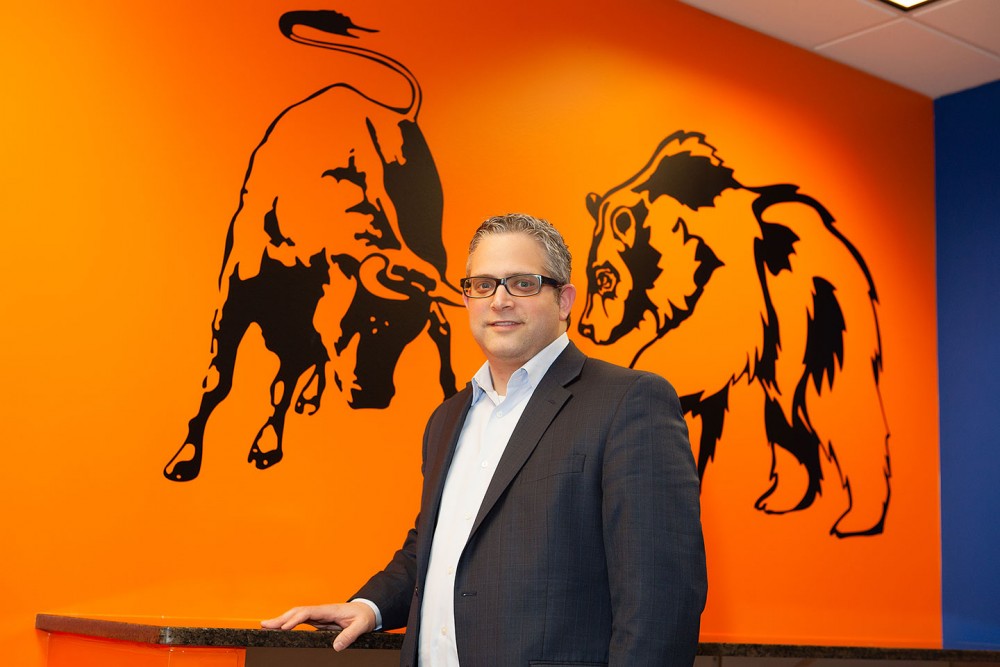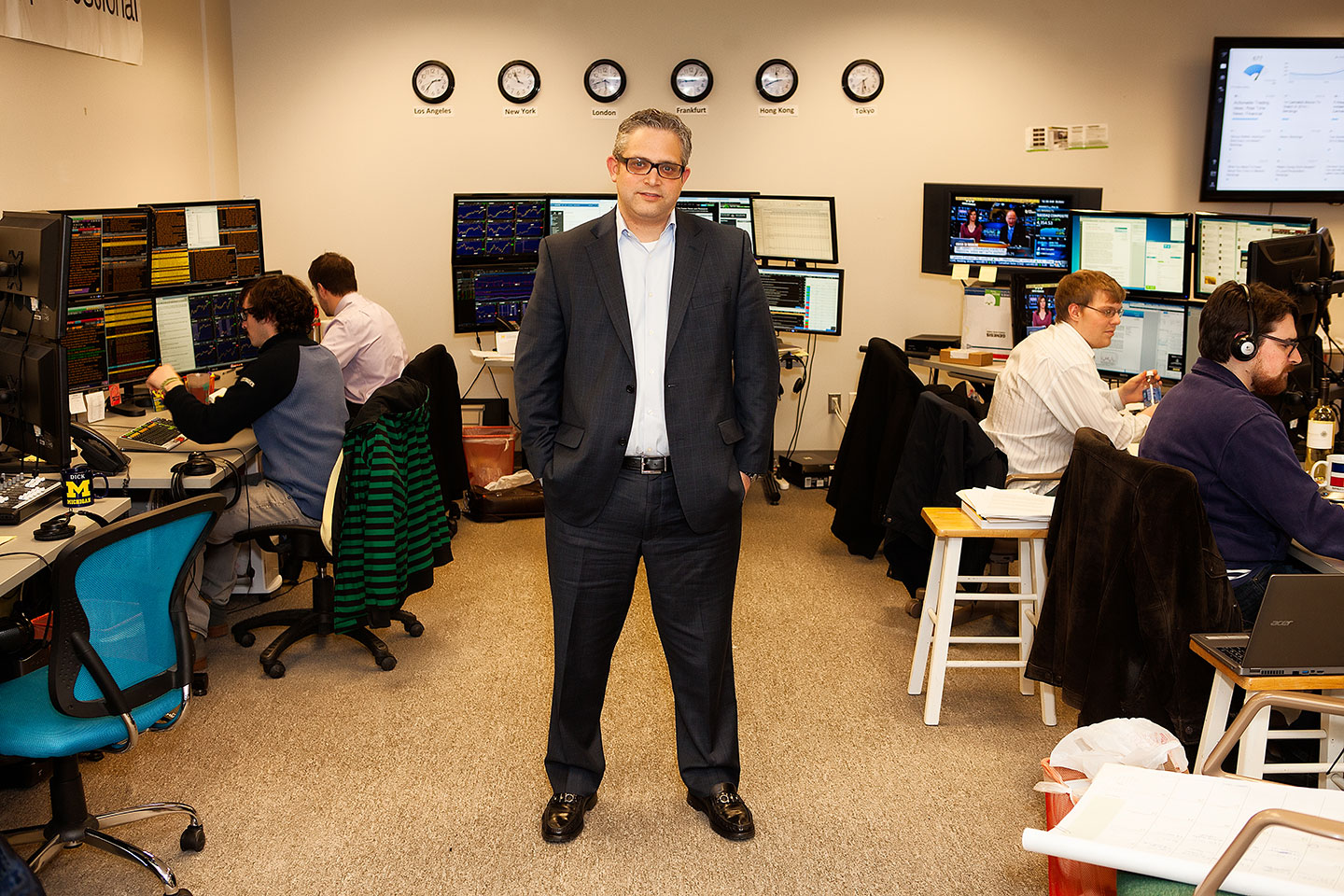There is a quality that entrepreneurs share. Call it intensity. Creativity. Obsession. Call it charisma. Or magnetism.
For Jason Raznick, Detroit entrepreneur and founder of Benzinga, a fast-growing financial media outlet building new platforms for investors, the word that best describes him is one that he has coined himself – “Doarchist.”
In contrast to a hierarchy, a “Doarchy” is defined by those who take action: doers. Jason explains, “In business as in life, I try to empower people as much as possible, so I came up with this word that governs what I do: a Doarchy is where a doer lives, breathes and excels. Everyone learns by doing – and failing – falling and rising and doing again.”
With premature silver in his hair and a piercing light in his blue eyes, Jason strikes one as a natural leader. Checking email, returning calls, bantering playfully with colleagues in an open office space that looks like a giant rec room filled with high tech toys, Jason is a stabilizing influence among his high-energy staff – some 30 writers, market analysts and coders all intent on invention – changing the game, paving their own way to a virtual Wall Street.
Working out of an office in his basement just four years ago, Jason launched his company, Benzinga, with a $10,000 investment. In short order, Benzinga turned a profit, gaining more than 50,000 users. With a rent subsidy for startups – made possible by a CommunityNEXT initiative of the Jewish Federation – Jason moved Benzinga to Bingham Farms. The following year, the company moved to new headquarters on 10 Mile Road in Southfield. Growing strong, Benzinga received $1.5 million from Lightbank, a venture capital fund backed by the founders of Groupon.

Today, Benzinga serves nearly 10 million readers in more than 125 countries by providing content to its public website and through its syndication partners. The company also offers premium subscription services and produces real-time tools and applications to give readers and professional traders an edge in the market.
Ever hungry for new talent and ready for opportunity, Benzinga plans for expansion into a larger space this summer, as well as new products and future build-outs on Benzinga and Marketfy (stay tuned).
Beyond Benzinga, Jason is fiercely loyal to Michigan (both the state and the University, Go Blue!). Deeply committed to community building and the growth of the city, he serves on the boards of ORT and Federation’s NEXTGen, and volunteers as a Startup Weekend mentor. Citing family as a primary motivation and constant source of energy and inspiration, Jason and his wife, Stacey, are the parents of two young children, Riley, four, and Joshua, two.
On the Power of “Doarchy”
Q: Jason, you have the heart and soul of an entrepreneur and often speak of your own D.I.Y. (Do It Yourself) mentality. Where did it start? Who were your early influences?
I would say “Doarchy” is the way I’ve always lived my life. A Doarchy is not about luck, status or ranking. It’s a hard work ethic.
In a strange way, I give credit to my first grade teacher – Mrs. Kent – who told my mother that I would never be able to read! I may have been academically slower than my peers, but I didn’t like being excluded in that way. What I learned from that experience is that I would have to be persistent, relentlessly creative and work harder . . . and that mentality has worked for me.
In a Doarchy, you find your purpose and go for it. When one door closes, you find another door to open. I sometimes prefer the no’s in order to find the more creative ways to get to ‘yes.’ Telling me ‘no’ puts me in another drive mode, and that’s the attitude that got me through high school at Andover, then to the Ross School of Business at the University of Michigan.

Are there other entrepreneurs in your family?
My grandfather was in the pickle business; had a company called Crown Pickles which he and his brothers sold to Vlasic. My father is a corporate tax attorney who has bought and sold businesses and helps others do the same. I’d say that he is the best I know in finding solutions to problems. My mom sat with me for countless hours to help me with my homework. She taught be the value of perseverance. Now with a partner in business, she has built a 20-plus property real estate portfolio. My Dad always used to tell me, “Don’t take ‘no’ for an answer and remember, the last four letters of American spell I can.”
On start-ups and becoming Benzinga
Q: For someone who prefers the answer ‘no,’ you have an impressive track record for success. How did you get your start with Benzinga?
I always have loved to find solutions to problems and am driven to accomplish audacious goals. For example, I was 16 years old when I started tinkering with a prototype for a digital video recording system. I was in the very preliminary stages working on a patent when TiVo executed faster and came out two years later! In college, back in the late ’90s, I had a few startups – a successful textbook site, a campus delivery site and a series of niche online dating sites.
Through all these start-ups, I’ve been a stock market junky. In effort to get a job at a hedge fund, I started writing about the markets. One thing led to another and the ball just kept rolling. Building my niche in providing friends actionable trading ideas put me on track for starting up Benzinga.
Where did you get the name Benzinga?
Benzinga is a word my grandfather and I made up. Back in the day, when my grandfather drove me to my speech tutor, we’d use the expression for laughs – as an exclamation. He’d go, “Benzinga, Benzinga!” And it sorta stuck.
We used to tell people Benzinga means “profit” in another language. Now that we have established the brand, we use it around the office for our routine exchanges – our Word Zingers and Daily Zings.
How did Benzinga get connected with the Jewish Federation?
I was thinking about moving to Chicago, until I read an article in The Detroit Jewish News about a program that was a new initiative of Federation’s CommunityNEXT with the purpose of attracting and retaining young talent and business startups in the community. Scott Kaufman (Federation’s CEO) was quoted in the article, mentioning that Federation may support young entrepreneurs with subsidized leases. So I reached out to Scott and, in fact, was the first to apply and receive a grant for space which I shared with another tenant.
And now, instead of moving to Chicago, Benzinga has attracted young Jewish talent to Michigan. For example, Evan Brandoff moved here from New York and Nathan Gilson from Boston. Both will surely make their mark here.
You have a unique and dynamic platform – one that functions as both a financial news bureau and a tech toolbox for investors of every stripe. Who are your competitors?
Our primary competition is attention span. Brain bandwidth. There are so many people looking for financial information out there on the Web, and there are a lot of places to go – so we have to be that much better and faster in providing information in a succinct and useful way.
And, we have to keep working to improve. Because if we don’t drastically improve someone’s life and positively impact how people get their information, there’s no need for our company. So we have to provide value at a glance when people first visit our site. To do this, we need to continually innovate and to attract new talent to our company. It takes a lot of work to maintain a competitive advantage. In the year we started Benzinga, four other similar companies started as well. They are all out of business now.

How do you maintain your edge?
We continue to learn through our users. Through our Marketfy platform, we learned how to provide reliable information that people were missing in the newsletter space. We learned to be more transparent and results-driven. In this business, you can’t survive on just one idea; you have to keep solving problems. And not just by increments. You have to take big steps to change the game.
Who inspires you? Who are your mentors?
Inspiration comes from my parents and family first, particularly my dad, Mel Raznick, and my brother, Brian Raznick. They’ve set the bar for me. Just seeing how they’ve lived their lives and the respect they’ve earned in business by doing the right thing and treating people fairly.
On the business side: Brad Keywell has acted as a close friend and mentor, as well as his partner Eric Lefkowsky from Groupon.
On giving back and community work
At the end of the day, we’re in business not just to succeed, but also to make a positive impact on our community. We all have one life to live – the question is what have we to give? What tools can we provide people to change the way they can get things done? How can we help empower people?
I got involved a few years ago with the Detroit ORT Board, working on their signature fundraiser, Rub-a-Dub. That was my first involvement in the Jewish community, working in a “professional” volunteer capacity. I then joined the NEXTGen board, where I have the opportunity to bring new ideas to the table at Federation.
I am also involved with JVS, working on their events. Last year, I was the recipient of the first annual JVS “Rising Entrepreneur Award” at their 15th Annual Strictly Business Networking event.
What changes have you seen in Federation’s NEXTGen and what changes would you still like to see?
What I see is a community pulling together as never before to reach out and engage young people and to identify and mentor those willing to step up to leadership roles. NEXTGen’s stated goal is clear and simple: transformation. We need to help create the kind of city where people choose to move and build their lives.
At Federation, Amy Brody is leading the talent initiative in a new program – NEXTGen Connect. She’s matched Benzinga with two summer interns.
But if you ask me, we need more people like Amy, more resources like NEXTGen Connect, more interns, more Michigan grads choosing to stay or return to the Michigan, more incentives for startups, more venture capital funding, more infrastructure in the city. More opportunity! To compete with cities like Chicago and New York, we need to be a lot more creative and purposeful and this all has to happen now.
On choosing Detroit
You could take a company like Benzinga anywhere. Why Detroit, why now?
Detroit is home for me. It’s family. A community where I’ve grown up. But most of all, I think of all the possibilities here. I’m a “Rocky” type person. I like the underdog story. Look, in ten years San Francisco will still be San Francisco, a great city. But I always like the challenge of being counted out, like when I was counted out by the teacher who said I wouldn’t read.

There always will be naysayers who will leave Michigan for others to rebuild. But if you’re a doer, looking to startup or grow a company, if you’re a doer looking to impact outcome here, if you have a family and care about the future in our community, then I say, game on and join a Michigan startup like ours. You’ll find a wealth of opportunities here in Michigan and a strong network of people ready and waiting to help you reach your goals.
Favorites
Restaurant: Café ML at Maple and Lahser — I never thought I’d like Brussels sprouts, I do now.
Place to meet for coffee or drinks: Starbucks Maple, Andiamo’s on Telegraph
Building in D skyline: Renaissance Center
Place to take kids, visitors: Detroit Zoo
Vacation place in Michigan: Charlevoix and Traverse City – always nice in the summer
Jewish food: Mom’s noodle kugel; my mother-in-law’s brisket
Passover tradition: Our family sings a song we made up: “There’s No Seder Like Our Seder, ‘cuz our Seder’s number One. (To the tune, There’s no business like show business)
Top websites: Benzinga! Detroit Free Press, Twitter, Quora
Apps: Benzinga, Foursquare, Asana
Sport: Golf
Never leave home without: My iPhone. Best time-saver and work tool I know
Daily Zinger: Luck favors the persistent
Reading now
Start Up Nation: The Story of Israel’s Economic Miracle, Dan Senor and Saul Singer




